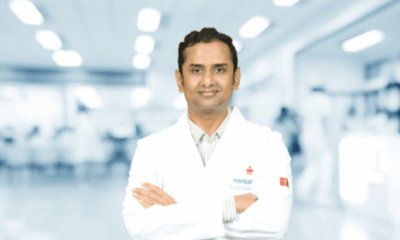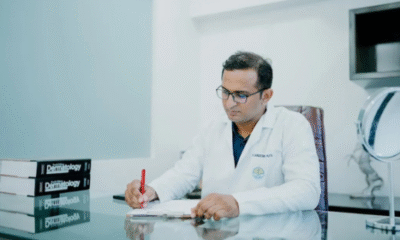Medical
The Rise Of Non Invasive Plastic Surgery: A Safer Alternative?

The landscape of plastic surgery is changing. We see this especially in north texas cosmetic surgery, where a shift towards non-invasive procedures is clear. This safer alternative eliminates the need for lengthy hospital stays, extensive recovery times, and the risks of general anesthesia. But what is driving this rise in non-invasive plastic surgery? Let’s delve into the factors contributing to this trend.
Understanding the Shift
People want change, but not at the cost of their health. Non-invasive procedures offer a balanced solution. They promise potential benefits, such as a youthful appearance, with less risk.
Common Non-Invasive Procedures
Procedures like Botox, dermal fillers, and laser treatments have entered the mainstream. They provide quick results with minimal downtime.
Benefits of Non-Invasive Procedures
Non-invasive procedures offer various benefits over traditional surgery. These include shorter recovery periods, less pain, and less risk of complications. They also tend to be more affordable.
The Role of Technology
Advances in technology have made non-invasive plastic surgery possible. Innovations in laser technology, for example, have paved the way for treatments that are quicker and safer.
Non-Invasive Vs. Traditional Plastic Surgery: A Comparison
| Non-invasive | Traditional | |
| Recovery time | Short | Long |
| Risk | Lower | Higher |
| Cost | Less expensive | More expensive |
| Anesthesia | Seldom necessary | Often required |
| Pain | Less | More |
Conclusion
The rise of non-invasive plastic surgery is a testament to our desire for safer, more accessible ways to enhance our appearances. As technology continues to advance, we can expect to see more innovative and less risky procedures entering the market.
Health
Five Common Myths About Small Animal Veterinary Care Debunked

Understanding small animal veterinary care can feel overwhelming. It’s easy to fall prey to myths when caring for our beloved pets. These myths often lead to unnecessary worry or improper care. A veterinarian in Silver Spring, MD sees these misconceptions frequently. They can cloud judgment and alter how we care for our pets. It’s crucial to separate fact from fiction to ensure our pets receive the best care possible. In this blog, we will address five common myths about small animal veterinary care. Each myth affects the way we perceive and handle the health of our small pets. By clearing up misunderstandings, we empower ourselves to make informed decisions. This approach keeps our pets healthy and happy. Let’s dive into these myths and reveal the truth that can guide us in nurturing our furry companions. Understanding these truths is the first step toward more effective pet care.
Myth 1: Regular Check-Ups Are Unnecessary
Many pet owners believe that if their pet seems healthy, regular vet visits aren’t needed. This myth can put pets at risk. Routine check-ups help detect issues early. Early detection means more treatment options and better outcomes. According to the American Veterinary Medical Association, regular exams are crucial for maintaining your pet’s health. These visits allow veterinarians to monitor growth, check for parasites, and update vaccinations. Skipping these can lead to missed health problems.
Myth 2: Indoor Pets Don’t Need Vaccinations
Some owners think indoor pets are safe from diseases. This belief is misleading. Vaccinations protect against diseases that can be carried indoors by other animals or even on clothing and shoes. Core vaccines are recommended for all pets, regardless of their lifestyle. Rabies, for example, is a virus that could affect indoor pets and is often required by law. Vaccinating your pet not only keeps them safe but also protects others around them.
Myth 3: Spaying and Neutering Cause Weight Gain
A common concern is that altered pets gain weight. While metabolism changes after spaying or neutering, weight gain is not a direct result of the procedure. Instead, it often relates to diet and exercise. Maintaining a balanced diet and regular activity keeps pets healthy. The ASPCA highlights the benefits of spaying and neutering, including preventing unwanted litters and reducing certain health risks.
Myth 4: A Wet Nose Means a Healthy Pet
People often think a wet nose indicates good health. The truth is that nose moisture can vary. Temperature or environmental changes can affect nose wetness. A dry nose doesn’t mean a pet is sick, just as a wet nose doesn’t guarantee health. Observe overall behavior, appetite, and energy levels for a better health assessment. If concerned, consult a veterinarian for a proper diagnosis.
Myth 5: Pets Self-Medicate with Grass
Many believe that pets eat grass to self-soothe or medicate. While some pets eat grass, it’s not necessarily for medicinal reasons. Dogs and cats may eat grass out of curiosity or boredom. Eating grass doesn’t replace professional care. Persistent grass eating followed by vomiting can signal an underlying issue. Consulting a vet provides peace of mind and ensures your pet’s well-being.
Comparison Table: Myth vs. Reality
| Myth | Reality |
| Regular check-ups are unnecessary | Important for early problem detection |
| Indoor pets don’t need vaccinations | Vaccinations protect against many diseases |
| Spaying/neutering causes weight gain | Weight gain is related to diet and activity |
| A wet nose means a healthy pet | Health assessment requires looking at behavior and energy |
| Pets self-medicate with grass | Grass eating doesn’t replace veterinary care |
Dispelling these myths ensures that we approach pet care with informed understanding. Proper care involves regular check-ups, vaccinations, and following professional advice. By debunking these myths, we are better equipped to provide the care our pets deserve. Remember, when in doubt, consult a veterinarian to guide you on the best path for your pet’s health. This proactive approach keeps our small animal friends healthy and thriving.
Health
A Day in the Life of a General Veterinarian: What to Expect

A day in the life of a general veterinarian is a blend of compassion, expertise, and dedication. At a pet clinic in Murrieta, CA, the day begins early. Veterinarians start by checking on overnight patients who need care and attention. The morning routine often includes a mix of wellness exams, vaccinations, and addressing concerns from pet owners. Each appointment allows me to assess the health and well-being of the animals. Midday brings more involved procedures such as dental cleanings or minor surgeries. These tasks require focus and precision. As the afternoon unfolds, emergencies may arise. A sudden illness or injury can shift priorities. Throughout the day, they communicate with my team to ensure each pet receives the best care possible. The day concludes with updating records and planning for tomorrow. In this role, adaptability and patience are key. Every day is unique, but the goal remains the same: healthy, happy pets.
Morning Routine
The morning starts around 7:30 AM when the Veterinarian arrives at the clinic. The first task is often to check on the animals that stayed overnight. They ensure they are comfortable and recovering well. Then, they move on to scheduled appointments. These usually include wellness exams, where they check vital signs and discuss any changes with the pet owners. Vaccinations are a routine part of the morning, helping to prevent diseases. This period is vital for maintaining the pets’ health and catching any issues early.
Midday Procedures
By late morning, veterinarians prepare for more complex procedures. Dental cleanings are common, requiring careful attention to each pet’s oral health. These procedures can prevent more severe health problems down the line. Minor surgeries, such as spaying or neutering, often occur at this time. They require precision and a steady hand. Each procedure is different, needing specific preparations and techniques. The focus during this time is on accuracy and ensuring the safety of each animal.
Afternoon Challenges
The afternoon can bring unexpected challenges. Emergencies, such as sudden illnesses or injuries, may disrupt the planned schedule. In these moments, quick thinking and decisive action are crucial. Collaborating with the team helps manage these emergencies effectively. Communication with pet owners is key, keeping them informed and involved in decisions. The ability to adapt is essential, as the unpredictable nature of the job means that priorities can shift rapidly.
Concluding the Day
As the day winds down, veterinarians focus on completing necessary paperwork. Updating medical records ensures continuity of care for each pet. This task is vital for future reference and for monitoring ongoing treatments. Planning for the next day involves reviewing the schedule and preparing for upcoming appointments. This preparation allows for a smooth workflow and helps anticipate any special needs. Although the day is long, the satisfaction of helping animals and their owners makes it worthwhile.
Common Procedures and Time Allocation
| Procedure | Time Spent | Frequency |
| Wellness Exams | 30 minutes | Daily |
| Vaccinations | 15 minutes | Daily |
| Dental Cleanings | 1-2 hours | Weekly |
| Minor Surgeries | 2-4 hours | Weekly |
| Emergency Care | Variable | As needed |
The Importance of Continued Learning
Keeping up with the latest veterinary practices is important. Veterinarians regularly attend workshops and read current research to stay informed. Trusted sources like the American Veterinary Medical Association provide valuable information and guidance. This ongoing education helps improve the care provided and ensures that they are using the best techniques available. The field of veterinary medicine is always evolving, so a commitment to learning is crucial.
Final Thoughts
Working as a general veterinarian is rewarding and challenging. Each day offers new experiences and opportunities to make a difference in the lives of pets and their families. The balance of routine care, unexpected emergencies, and ongoing learning keeps the work dynamic. Veterinarians are committed to providing the best possible care and ensuring the well-being of every animal I treat. This profession requires dedication, compassion, and a deep understanding of both science and empathy.
Dental
Choosing The Right General Dentist: Tips For Finding The Perfect Fit

Choosing the right general dentist can feel daunting, but it’s essential for maintaining oral health. A good dentist does more than clean teeth. They build trust and guide patients through various dental needs. Whether you need routine check-ups or more complex procedures, like dental implants in Northeast Philadelphia, finding the right fit is crucial. Consider these three key aspects when selecting a dentist. First, look at their qualifications and experience. This ensures they have the necessary expertise. Second, consider their approach to patient care. A dentist should explain procedures clearly and make patients feel comfortable. Third, assess the range of services offered. A dentist who provides a wide variety of treatments can address changing needs over time. By focusing on these areas, you can make an informed choice. Remember, the right dentist helps keep your smile healthy and bright for years to come.
Qualifications and Experience
One of the most important factors in choosing a dentist is their qualifications. Dentists should have a degree from a recognized dental school and hold a license to practice. Experience is equally important. A dentist who has been practicing for several years often has a broader understanding of different dental issues. According to the American Dental Association, continuous education is vital. Dentists who engage in ongoing training stay up-to-date with the latest techniques and technologies. This is particularly important when considering advanced treatments like orthodontics or implants. An experienced dentist can often provide better insights and more effective solutions.
Patient Care Approach
A good dentist prioritizes patient comfort and communication. They take the time to explain treatment plans and address concerns. When visiting a potential dentist, pay attention to their willingness to listen. A professional who is attentive and considerate often provides a more satisfying experience. Building rapport with patients helps in reducing anxiety and ensures better outcomes. The Centers for Disease Control and Prevention emphasizes the importance of patient-centered care. Dentists who engage with patients actively contribute to a more positive healthcare experience. This approach not only improves patient satisfaction but also enhances trust.
Range of Services
Another key consideration is the range of services a dentist offers. While some dentists focus on general care, others offer specialized treatments. Find a dentist who provides services that match your specific needs. Having a single provider for multiple treatments can be more convenient and can ensure continuity of care. For instance, if you anticipate needing cosmetic procedures, select a dentist skilled in those areas. Below is a comparison of common dental services to assist in your decision-making process:
| Service | Description | Considerations |
| Routine Check-Ups | Regular exams, cleanings, and preventive care. | Essential for maintaining oral health. |
| Orthodontics | Braces and alignment treatments. | Useful for correcting misaligned teeth. |
| Cosmetic Dentistry | Whitening, veneers, and aesthetic improvements. | Improves appearance and boosts confidence. |
| Restorative Procedures | Fillings, crowns, and implants. | Restores function and structure of teeth. |
Location and Accessibility
Choosing a dentist conveniently located can make a significant difference. Proximity to home or work reduces the hassle of appointments. It ensures you can attend emergency visits without delay. Accessibility is another factor to consider. Check if the dental office is accessible for those with mobility challenges. Convenient office hours are also important. Dentists with flexible scheduling can better accommodate busy lifestyles. This makes it easier to keep up with routine oral care.
Insurance and Payment Options
Understanding the financial aspects of dental care is crucial. Confirm that the dentist accepts your insurance plan. This alleviates financial concerns and ensures you get the most out of your benefits. If you don’t have insurance, inquire about payment plans or discounts. Some practices offer financing options to make treatments more affordable. A transparent fee structure helps avoid unexpected expenses and allows for better budgeting.
Recommendations and Reviews
Personal recommendations can be invaluable. Ask family and friends about their experiences with local dentists. Online reviews also offer insights into patient satisfaction. Pay attention to comments about the dentist’s professionalism, the office environment, and overall experience. Patterns in reviews can highlight strengths or potential areas of concern.
Conclusion
In summary, choosing the right dentist involves several considerations. Focus on their qualifications, patient care approach, and the range of services offered. Location, accessibility, insurance acceptance, and recommendations also play key roles. By evaluating these factors, you can find a dentist who meets your needs and contributes positively to your oral health journey. A well-chosen dentist ensures not only a beautiful smile but also long-term health and well-being.




